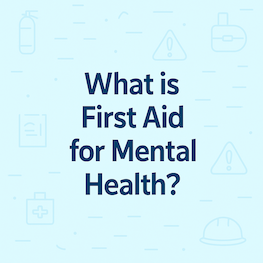First Aid for Mental Health: Everything You Need To Know.
By Pete Kenningham - Managing Director
Most people have heard of first aid. Not as many know about first aid for mental health. But with 50% of work absences last year resulting from mental illness, it’s needed more than ever before.
I’m Pete Kenningham, founder of Jewel Safety. We train and equip people to tackle mental ill health in the workplace. It’s something we’re very passionate about, and you’ll be able to see why below.
This guide attempts to answer many of the questions we get asked, about Mental Health First Aid.
What is Mental Health First Aid? Why is it important in the workplace? Does your business need a mental health first aider? And, why are we the people to teach it to you? We answer all these questions and more below.
What is a Mental Health First Aider?
A standard first aider acts as a first point of contact for anyone who has sustained a physical injury at work. They can prevent the condition worsening and will arrange for further help to come if needed.
Mental health first aiders do the same but for people’s mental rather than physical health. Anyone in a business or organisation who is suffering from a mental health condition or suspects that they are, be it anxiety, depression, or something else, can visit this person for help.
For example, if you cut or burnt your finger, you would expect there to be someone who could tell you what to do. They aren’t going to operate on you but will point you in the direction of professional medical help or even arrange for a visit from the emergency services, depending on the severity.
Likewise, a mental health first aider isn’t there to be a counsellor or therapist but can certainly chat through your situation and point you in the direction of professional help should you need it. Going to see your GP is usually a first point of call.
Why is First Aid for Mental Health important in the workplace?
The boring answer to this is that under Healthy and Safety regulations, employers are required to consider employees mental health as well as their physical health. Whilst having a mental health first aider isn’t an explicit requirement, it’s clear you need something in place.
The more interesting answer is that unnoticed and un-dealt with mental health problems can have a serious impact on the workplace productivity and more (see below).
Having a mental health first aider in your business shows employees that you’re taking their mental health seriously. During the Coronavirus Pandemic we saw hundreds of thousands of people resign and leave jobs that they weren’t happy in. Clearly, a huge value is placed on how a company supports its staff during tough times. Having mental health provision could be the difference between employees staying or leaving.
What is the impact of mental illness in the workplace?
Approximately 1 in 4 people in the UK will experience some form of mental illness in any given year. That ratio is bound to apply to your workplace too.
Everybody needs to take care of their mental health just like they take care of their physical health. Some people have an actual mental illness. Sometimes it’s temporary and treatable and in other cases it is something they live with daily. Regardless of the situation, unchecked mental health issues in your staff can cause problems.
According to the HSE, in 2019/20, just under 18 million sick days were taken due to stress, depression or anxiety. Even newer figures show that 822,000 workers in the UK suffered from work related stress, depression, or anxiety in the 2020/21 financial year. And these mental health conditions accounted for 50% of work-related ill health.
Of course, these figures will be skewed by the impact of the coronavirus pandemic and widespread lockdown measures. Nonetheless it clearly has a huge impact and even if we assumed that in a normal year those numbers were halved, it would still account for a significant proportion of sick days.
Mental illness can also have a significant impact on the productivity, focus and motivation of your staff. Not to mention the very real dangers of self-harm and suicide, should they have to battle this on their own without the support of their employer.
Does an employer’s duty of care include mental health?
Short answer: Yes, it does. The HSE states that employers must provide a safe working environment. Whether work is causing a health issue or aggravating it, employers have a legal responsibility to help their employees, and this includes harm to people’s mental health.
Work related mental health issues must be assessed to measure the levels of risk to staff.
Why did you get into mental health first aid?
Personal experience of anxiety, depression and PTSD mean this is something I’m hugely passionate about. You don’t need to have personal experience to teach a mental health course, but it certainly helps.
Almost 20 years ago I had multiple bereavements and during the toughest period of my life, received little to no support from my employer. I was surrounded by a work culture of ‘man up’ and ‘pull yourself together’. It wasn’t healthy and wasn’t what I needed at the time.
I want to help make sure other people in similar situations aren’t left to fend for themselves. Every workplace should have someone that people suffering with mental health conditions can go to for help.
How has your experience impacted your courses?
Having been through personal experience of mental ill health I can weave this into the teaching. Personal stories bring difficult subjects to life and help to communicate key aspects of the course.
When I share personal stories, people tend to open up and feel more comfortable in the class. In that moment I’m not just a teacher, reading off a PowerPoint presentation, but someone who’s been through it themselves.
Whilst I don’t encourage people to be open about their experience, it can improve the atmosphere in the room. It sometimes leads to conversations between colleagues that wouldn’t have otherwise happened.
Who is a mental health first aid course for?
So, you think having a mental health first aider in your organisation is a good idea, but who should it be?
Anyone can take a mental health first aid course and there are different levels that suit different positions (more on that below). A lot of companies will ask the person or persons who are already qualified in First Aid to take this on as well. The only problem is this could end up being too much responsibility and may not align with their skills.
The course covers some difficult topics including suicide and self-harm. This is real stuff and being the person that employees know they can go to if they’re struggling, is a big responsibility. It goes without saying that it won’t be for everyone. Someone who’s already struggling in this area or has too many other commitments would probably not be the ideal candidate.
Anyone who is good at talking to people and is sensitive to people’s situations would be a good pick. Maybe it’s something you could do?
What would you say to someone who says, “I don’t think we need this”?
Of course, you might be sceptical about the need for something like this. That’s understandable, although mental health should still factor into your duty of care to employees. A big way of doing this is providing a mental health first aider within your workforce.
Apart from the benefits to your employees, there is a clear business case for doing this. Mental health costs UK businesses £35 billion every year. This is primarily down to mental illness reducing staff’s ability to perform and be present in their job.
When taken seriously, the wellbeing of your staff can have a huge impact on your work culture and improve the chances of people sticking around. Employers who don’t take this seriously risk not being very popular, particularly with younger members of staff.
How many Mental Health First Aiders should you have in a company?
There are no hard and fast rules for this, but I advise having one MH First Aider for every 10 members of staff. If you have more staff than that it probably wouldn’t hurt to have another person who is trained. They can take on the responsibility should the other person be unable to fulfil that role. You can never have too much support for this stuff.
What levels of training do you teach and where do they normally take place?
There are 3 levels of Mental Health First Aid training. Level 1 is a half day course which has sufficient teaching for someone to help employee’s wellbeing in your workplace.
Level 2 is a 1-day course that covers everything you need to know to be an effective Mental Health First Aider. Level 3, which is a 2-day course, is more for upper-level management and the people that are running your company at different levels. This is great if you are supervising first aid in your company.
We generally try and teach these courses at your premises, such as we did when we ran courses at Hull College. This way it’s easy for you and takes place in a familiar environment.
Find more information on our first aid for mental health course page



